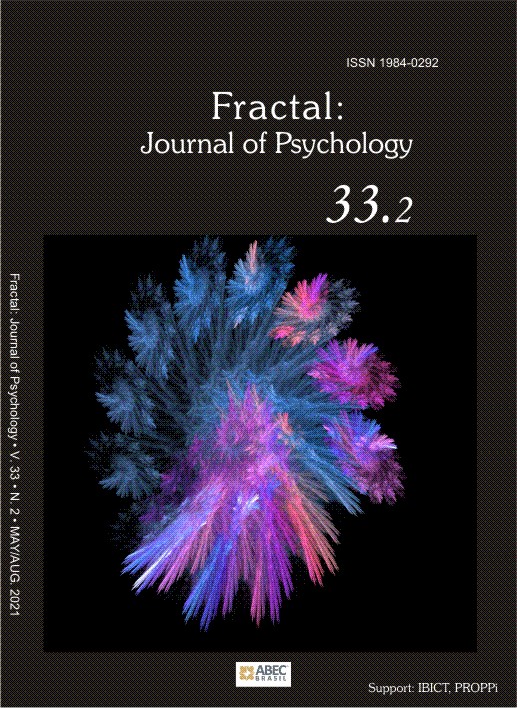Encapsulation:
autonomy and dependence in the CAPSad work process
DOI:
https://doi.org/10.22409/1984-0292/v33i2/5793Keywords:
mental health services, workers, professional autonomy, chemical addictionAbstract
This article analyzes the factors that facilitate or hinder the production of autonomy among users who experience addiction in a CAPSad. This is the result of qualitative research with all professionals a CAPSad. It was performed 80 hours of observation, press conference with ten employees and 13 in-depth interviews, followed by thematic analysis. Found missing conditions for the production of autonomy of users in the service studied. Based on Edgar Morin and Gastao Campos it was possible to observe that essential factors for the production of autonomy of workers and users in coping with drugs – such as adequate working conditions, decent wages, engaged professionals and a psychosocial support network – were not observed. These situations lead to the feeling of “encapsulation”, as verbalized, which contributes to having an affective distancing attitude of caring dimension of health work. So if there is no autonomy in the work process it is extremely difficult that they can produce the feeling of autonomy on the part of users who, before this, persist in double dependence - service and chemical.
Downloads
References
BARDIN, L. Análise de conteúdo. Lisboa: edições 70, 2009.
BRASIL. Portaria nº 336 de 19 de fevereiro de 2002. Estabelece as normas e diretrizes para a organização e funcionamento dos CAPS. Brasília: Diário Oficial da União.Brasília, 2002.
CAMPOS, G. W. S. Sobre a peleja dos sujeitos da reforma, ou da reforma dos sujeitos em peleja. Saúde e Sociedade, v. 1, n. 2, p. 79-95, 1992.
CAMPOS, G.W.S. Subjetividade e administração de pessoal: considerações sobre modos de gerenciar trabalho em equipes de saúde. In: MERHY, E. E.; ONOCKO, R. (Org). Agir em saúde: um desafio para o público. 2 ed. (pp. 229-265). São Paulo: Hucitec, 2007.
CAMPOS, G. W. S. Considerações sobre a arte e a ciência da mudança: revolução das coisas e reforma das pessoas - o caso saúde. In: CECÌLIO, L. C. O. (Org.). Inventando a mudança na saúde. 3 d. (pp. 29-88). São Paulo: Hucitec, 2006.
CAMPOS, G. W.S. Saúde, Sociedade e o SUS: imperativo do sujeito. Saúde e sociedade, 18 (supl, 2), 2009.
CAPONI, S. (1997). Georges Canguilhem y el estatuto epistemológico del concepto de salud. Hist. cienc. saude-Manguinhos, Rio de Janeiro, v. 4, n. 2, p. 287-307, 1997.
FARIA, H.X.; DALBELLO-ARAUJO, M. Uma perspectiva de análise sobre o processo de trabalho em saúde: produção do cuidado e produção de sujeitos. Saúde e sociedade, v. 19, n. 2, 2010.
MORIN, E. A noção de sujeito. In Schnitman, D. F. (Org.). Novos paradigmas, cultura e subjetividade. (pp. 117-128). Porto Alegre: Artes Médicas, 1996.
MORIN, E. A necessidade de um pensamento complexo. In Mendes, C. Representação e complexidade. (pp. 69-78). Ed. Garamond, 2003.
MORIN, E. A cabeça bem feita: repensar a reforma, reformar o pensamento. Tradução de Eloá Jacobina. 9 ed. Rio de Janeiro: Bertrand Brasil, 2004.
MORIN, E. Ciência com consciência. 8 ed. Rio de Janeiro: Bertrand Brasil, 2005.
MORIN, E. Introdução ao pensamento complexo. 5 edição. Porto Alegre: Sulina, 2015.
ONOCKO-CAMPOS, R. T.; Campos, G. W. S. Co-construção de autonomia: o sujeito em questão. In: CAMPOS, G. W. S. et al. Tratado de Saúde Coletiva. 2 ed. (pp. 669-687). São Paulo: Hucitec; Rio de Janeiro: Fiocruz, 2012.
RIBEIRO, L. A.; SANCHEZ, Z. M.; NAPPO, S. A. Estratégias desenvolvidas por usuários de crack para lidar com os riscos decorrentes do consumo de droga. J Bras Psiquiatr, Rio de Janeiro, v. 59, n. 3, 2010.
VASCONCELLOS, V. C.; AZEVEDO, C. Trabalho em saúde mental: vivências dos profissionais diante dos resultados. Psicologia em Estudo, Maringá, v. 17, n. 4, p. 659-668, 2012.
WANDEKOKEN, K. D. Efeitos subjetivos do processo de trabalho vivenciados por profissionais em um Centro de Atenção Psicossocial Álcool e Drogas. Tese de Doutorado em Saúde Coletiva, Programa de Pós-graduação em Saúde Coletiva, Universidade Federal do Espírito Santo, 2015.
Published
Versions
- 2021-11-12 (2)
- 2021-08-31 (1)
How to Cite
Issue
Section
License
Copyright (c) 2021 Kallen Dettmann Wandekoken; Maristela Dalbello-Araujo; Francis Sodré

This work is licensed under a Creative Commons Attribution 4.0 International License.
Authors publishing in this journal agree to the following terms:
- Authors retain copyright and grant the journal the right of first publication, with the work simultaneously licensed under the Creative Commons Attribution License allowing sharing of the work with acknowledgement of authorship of the work and initial publication in this journal.
- Authors are permitted to enter into additional contracts separately for non-exclusive distribution of the version of the work published in this journal (e.g., publishing in an institutional repository or as a book chapter), with acknowledgment of authorship and initial publication in this journal.

This work is licensed under a Creative Commons Attribution 4.0 International License.
To the extent possible under the law, Fractal: Journal of Psychology has waived all copyright and related rights to the Reference Lists in research articles. This work is published in: Brazil.
To the extent possible under law,Fractal: Journal of Psychology has waived all copyright and related or neighboring rights to Reference lists in research articles. This work is published from: Brazil.







